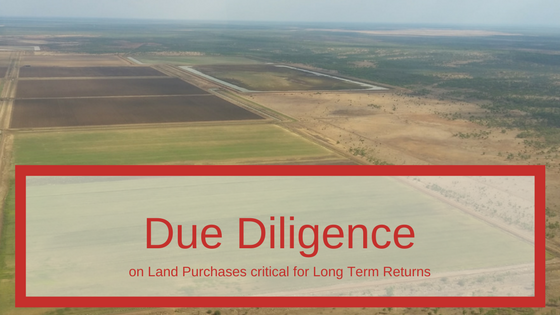
By Ian McLean and Dr. Phil Holmes
Historically, more wealth has been created in the beef industry through increases in the value of land than through beef production. There has also been considerable wealth destroyed when price driven optimism has not eventuated.
We believe that for long term business returns to be dependent on future capital gains, and the eventual sale of the asset, is a risky proposition. It also has the potential to result in significant cash shortfalls in the meantime.
It is possible to have businesses that generate reasonable returns during ownership, rather than only upon sale. Performing comprehensive due diligence on any land purchases is a key factor in achieving this for growing businesses.
A critical component of due diligence is determining what the ‘value’ of the potential acquisition is to you. A premise to this approach is that a piece of land does not have the same value to all potential purchasers but has an intrinsic value unique to each potential purchaser, dependent on what profits they can generate from it. We follow the thinking of Warren Buffett here (arguably one of the best allocators of capital the world has ever seen, and property purchases are all about allocation of capital), who says ‘price is what you pay, value is what you get’.
‘Price is what you pay, value is what you get’
The management system and existing business of every potential purchaser will determine what the incremental profits from the acquisition are. Estimating these incremental profits will allow you to determine what the intrinsic value of the asset is to you.
A key consideration in these calculations is how to incorporate future capital gains into the purchase price? If historical capital gains are 2-4% p.a. in real terms, do we assume that this will continue and factor it into our incremental returns?
We do not believe you should, primarily because doing so is subscribing to what economists refer to as the ‘bigger fool theory’, which is where more is paid for an asset than its intrinsic value in the belief that a ‘bigger fool’ will come along and pay more in the future. Historically significant wealth has been created (and some lost as well) this way, but there are some serious implications. Firstly, if the returns are all from capital then the business runs the risk of serious cash shortfalls, particularly if debt is involved.
‘Prediction is very difficult, especially if it’s about the future’
Secondly, there is no guarantee that capital returns will continue, whilst land values have increased on average in the long term, there have been periods where they have been quite stagnant, and also negative. What they will do going forward is unknown (‘prediction is very difficult, especially if it’s about the future’, Nils Bohr), but it would be reasonable to assume that as interest rates and cattle prices trend away from their current lows and highs respectively, there is potential for downward pressure on land prices.
We can draw on the wisdom of Warren Buffet again here; when he purchases shares in a company, he does so under the assumption that the share market could close the next day, and he would not care, because he is happy with the intrinsic value of the asset. He also says ‘Never count on making a good sale. Have the purchase price be so attractive that even a mediocre sale gives good results’. We believe these apply to rational capital allocation in agriculture, as well as in the share market.
Any future capital gains should be treated as icing on the cake, rather than necessary for the investment to work. A beef business that can generate returns that meet or exceed its cost of capital through business operations alone, rather than through future capital gains will be a sustainable business that can provide a reasonable return to its owners without being sold.
The 2017 Australian Beef Report includes a section on performing due diligence for a property purchase and includes a tool that users can use to value a property purchase or lease for themselves.
